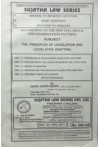- Author(s): Gade Veera Reddy
- Publisher: Sujatha Law Books Pvt Ltd.
- Edition: Latest Ed
- Approx. Pages 274 + Contents
- Format Paperback
- Approx. Product Size 33 x 21 cms
- Delivery Time 3-5 working days (within Kerala & South India) (Others 7-9 days)
- Shipping Charge Extra (see Shopping Cart)
............................................................................................
Description
Unit I. Principles of Legislation and Legislative Drafting
Unit II. Factors which Influence Decision of the Legislator
Unit III. Ideals of Drafting
Unit IV. Process and Preparation of Legislative Drafting
Unit V. Different Parts of Statue
Legislative drafting like any other form of legal drafting is an institutionalised means of communication. The essential distinction is that unlike other forms of legal drafting which may be easily altered or changed, legislative drafting is more of a permanent enactment which stands on its own and speaks for itself without any form of assistance, elucidation or explanation from the drafter or draftsman. It is imperative that a great deal of care and diligence be exercised in drafting enactments to reduce as much as possible the probable difficulties and confusion that may befall the future administration and interpretation of enactments. Thus, the legislative drafting process may be said to begin with the receipt of drafting instructions and ends with completion of the draft. For there to be a legislative drafting, there must be a legislative draftsman.
LEGISLATIVE DRAFTSMAN
A legislative draftsman is a person engaged in the drafting of legislative Bills and other instruments at whatever level of government. In Nigeria, the offices of legislative draftsmen are found in various government ministries, parastatals and in all legislative institutions.
.........................................................................................
Contents
UNIT-I : Principles of Legislation: As a Tool of Power - Objectives of Civil & Criminal Legislation, Anticipated Goals - Limitations of Legislation as a Tool for Change in relation to Religion, Morality and Tradition-Forms of Legislative Instrument: Bills, Acts, Orders, Rules, Schedules. Related Provisions, Schedules and Relevant Case Laws under the Constitutional Law.
UNIT-II : Factors which Influence Decision of the Legislator - Correlation between Public Opinion and Legislative Formulation - Some Major Problems and Trends in Legislative Formulation in a Modern Welfare State.
UNIT-III : Ideals of Drafting: Simplicity, Preciseness, Consistency, Alignment with Existing Law, and Brevity - Classification of Statutes - Amending, Consolidating and Codifying Statues.
UNIT-IV : Process and Preparation of Legislative Drafting - General Rules, Words Selection, Syntax, Style, Punctuation - Reference of Other
Related Laws, and Existing Law - Conformity with Constitutional Provisions - Legislative Process: Preparatory Process, Conceptual
Process, Consultative Process, Green & White Papers, and Cabinet Control.
UNIT-V : Different Parts of a Statute: Long Title and Preamble - Enacting Formula - Short Title, Extent and Application, Definitions and Principle Provisions-Administrative Machinery, if any, Contemplated by Statute - Penal Provisions, Rule and Regulation Making Power - Temporary Provisions-Repeal and Savings - Punctuation and Marginal Notes - Provisions, Illustrations and Presumptions - Use of Non-Obstante Clauses - Retrospective Effect - Henry VIII Clause - Exceptions - Fictions - Explanations.
............................................................................................
Author Details
Gade Veera Reddy, B.Sc., LL.B., M.A., (M.B.A)
(Recipient of 5 Medals in Law) (K.U)
Advocate High Court, Kothi, Hyderabad - 500095, T.S.

